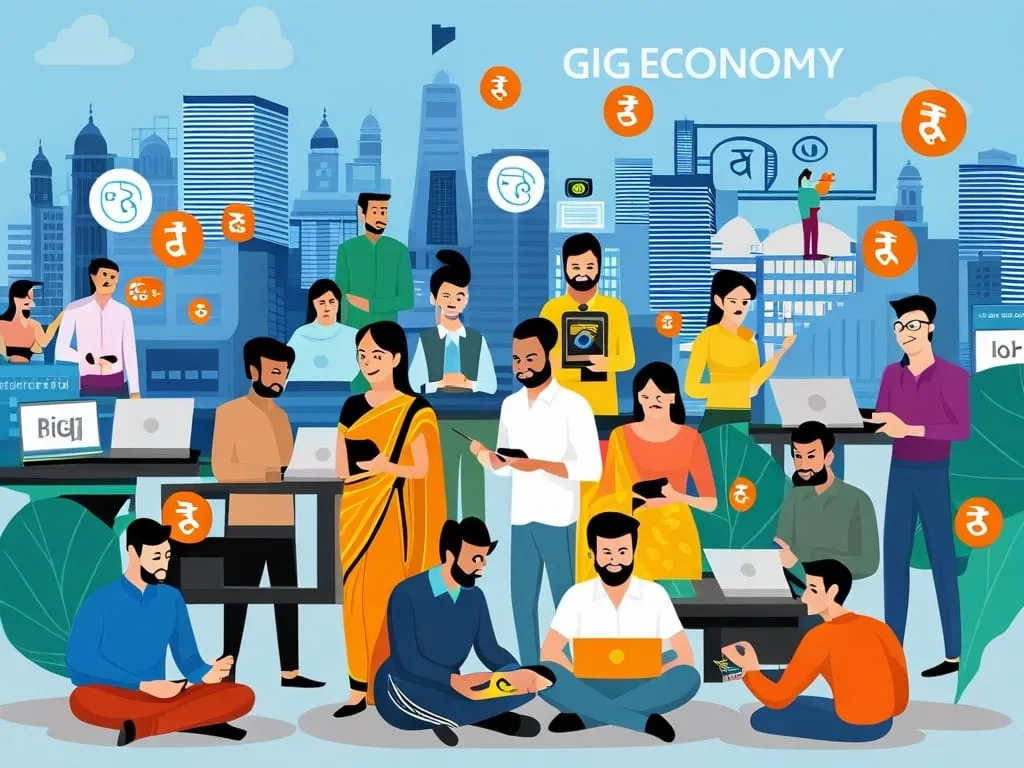The gig economy has been transforming the Indian job market at an unprecedented pace, and its impact extends far beyond the realm of employment. It is reshaping how people manage their finances, forcing a rethink of traditional financial planning methods. In this dynamic landscape, freelancers, contract workers, and gig hustlers are redefining what it means to earn a living and plan for the future.
The End of Monthly Salaries
For many Indians, the concept of a monthly salary is becoming a relic of the past. Instead, income flows are now more akin to a dynamic stream, fluctuating with the ebb and flow of projects and gigs. This shift necessitates a new approach to budgeting, one that is flexible and adaptable to the unpredictable nature of gig work.
Imagine a freelancer who earns a substantial amount one month but faces a dry spell the next. Traditional budgeting methods, which rely on a steady income, are no longer effective. Here, the key is to create a budget that can absorb these fluctuations. This might involve setting aside a larger portion of income during good months to cover expenses during leaner times.
Savings Strategies
Saving money is crucial in any financial plan, but it becomes even more critical in the gig economy. Without the security of a regular paycheck, gig workers must be proactive about saving. One strategy is to use the 50/30/20 rule as a guideline, but with a twist. Instead of allocating 50% of income towards necessities, 30% towards discretionary spending, and 20% towards savings, gig workers might need to adjust these proportions based on their income variability.
For instance, during months when income is higher, gig workers could allocate a larger percentage towards savings and emergency funds. This way, they can build a financial cushion that helps them navigate through periods of low income.
Investment in a Gig Economy
Investing is another area where gig workers need to think differently. With irregular income, it can be challenging to commit to regular investment plans. However, this doesn’t mean that investing is off the table. Instead, gig workers can opt for more flexible investment options such as mutual funds or stocks that allow for sporadic investments.
Technology has made it easier for gig workers to invest small amounts at their convenience. Mobile apps and online platforms offer the ability to invest as little as ₹100 at a time, making it feasible to invest whenever there is a surplus of funds.
Managing Risk and Stability
Risk management is a critical aspect of financial planning in the gig economy. Without the safety net of employer-provided benefits like health insurance or retirement plans, gig workers must take these responsibilities upon themselves. This includes investing in health insurance, creating a retirement fund, and even considering disability insurance to protect against income loss due to illness or injury.
Stability, in this context, is not about having a fixed income but about creating a financial framework that can withstand the ups and downs of gig work. This might involve diversifying income streams – for example, by taking on multiple gigs or projects simultaneously – to reduce dependence on any one source of income.
The Role of Digital Platforms
Digital platforms have been instrumental in the rise of the gig economy, and they also play a crucial role in financial management. These platforms often provide tools and resources that help gig workers manage their finances more effectively.
For instance, some gig platforms offer features that help workers track their earnings, manage their taxes, and even access financial services like loans and insurance. These tools can be invaluable for gig workers who need to navigate the complexities of financial planning on their own.
Impact on Women and Young Workers
The gig economy has particularly benefited women and younger workers in India. For women, the flexibility offered by gig work allows them to balance their professional and personal lives more effectively. Many women who might have been unable to take on full-time jobs due to family commitments can now engage in gig work that fits their schedules.
Younger workers, especially Gen Zs and millennials, are also drawn to the gig economy because of its flexibility and the opportunity to hone specialized skills. This demographic shift is pushing organizations to rethink their hiring strategies and embrace the flexibility that the gig economy offers.
Legal and Regulatory Challenges
Despite the many benefits, the gig economy also poses significant legal and regulatory challenges. Gig workers often lack the legal protections and benefits that traditional employees take for granted. This includes access to social security, workers' compensation, and other benefits.
In India, there is a growing need for policymakers to clarify and extend protections for gig workers. This could involve defining clearer rights for gig workers, ensuring they have access to basic benefits, and enforcing these protections more consistently.
Geographical Expansion and Talent Markets
The gig economy is not just about individual workers; it also has implications for how organizations operate. Companies are now looking to tap into new talent markets, particularly in Tier II and III cities in India. This expansion is driven by the need for diversification and the exploration of untapped consumer bases.
For smaller organizations, the gig economy offers a way to access specialized talent without the high costs associated with full-time employment. Larger tech firms, on the other hand, are using the gig economy to tap into diverse skill sets and innovate more rapidly.
Balancing Traditional and Gig-Based Models
As the gig economy continues to grow, organizations are faced with the challenge of balancing traditional employment models with gig-based ones. This involves reevaluating workforce structures and focusing on geographical expansion to tap into new talent markets.
Strategic partnerships are being forged to gain a competitive advantage and access new markets. The future of work is defined by a dynamic balance between efficiency improvements from automation and the expansive potential of creativity and innovation.
Personal Financial Discipline
In the gig economy, personal financial discipline is more crucial than ever. Without the structure of a traditional job, it’s easy to fall into bad financial habits. Here, setting clear financial goals and tracking expenses meticulously can make a significant difference.
Using budgeting apps and financial tools can help gig workers stay on top of their finances. It’s also important to avoid lifestyle inflation – the tendency to spend more as income increases – and instead direct excess funds towards savings and investments.
Conclusion
The gig economy is not just a trend; it’s a fundamental shift in how we work and manage our finances. For Indians navigating this new landscape, it’s essential to be adaptable, proactive, and informed. By embracing the flexibility and opportunities of the gig economy, individuals can thrive in a world where traditional financial planning methods no longer apply.
In this evolving ecosystem, the key to financial freedom lies in creating a financial plan that is as dynamic as the income streams it supports. It’s about finding the right balance between risk and stability, and using technology and digital platforms to manage finances more effectively.
As we move forward, it’s clear that the gig economy will continue to reshape financial management practices in India. By understanding these changes and adapting to them, we can ensure that this new era of work brings not just challenges, but also unprecedented opportunities for financial growth and stability.






